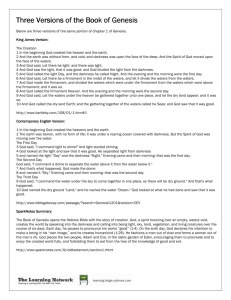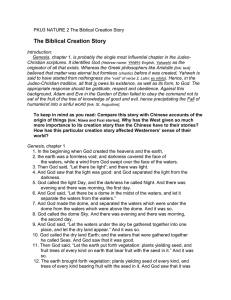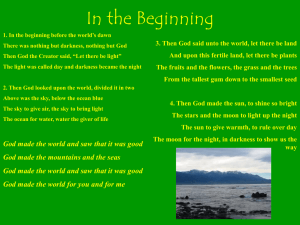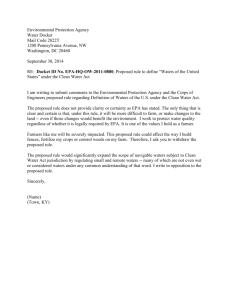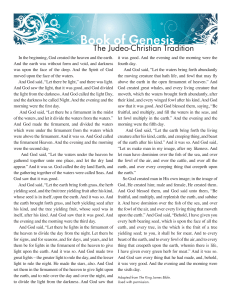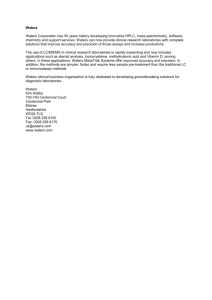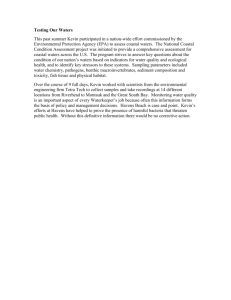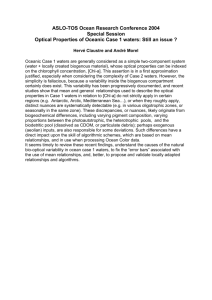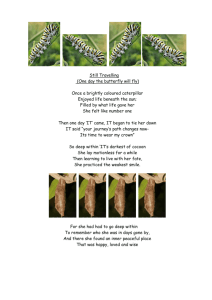1In the beginning when God created the heavens
advertisement
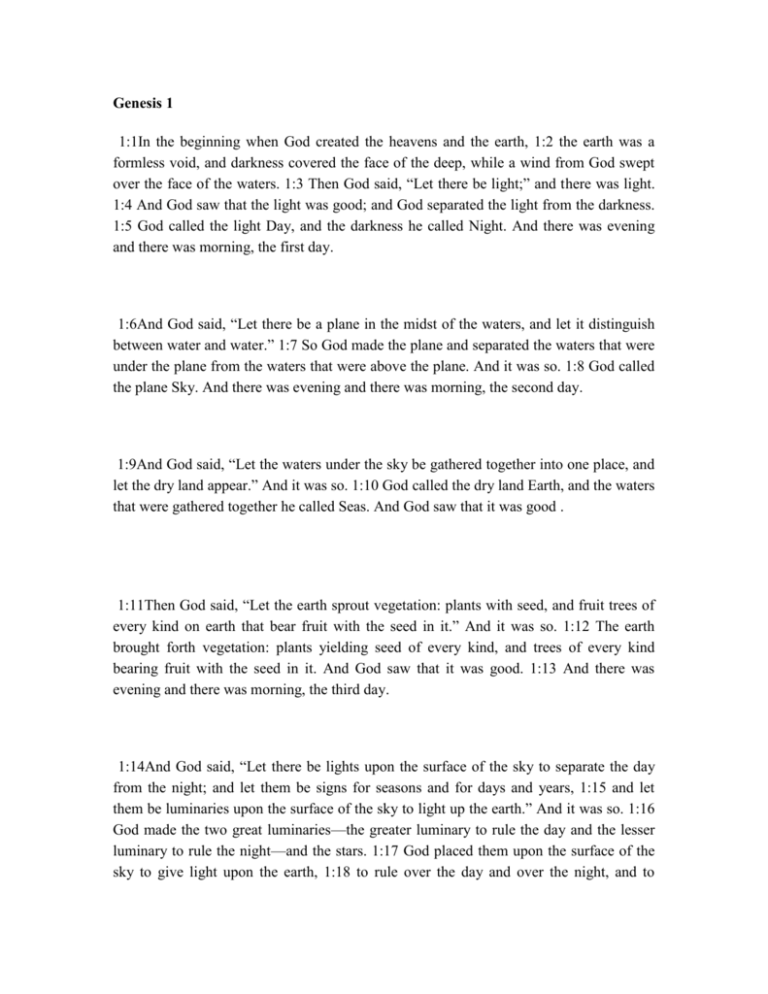
Genesis 1 1:1In the beginning when God created the heavens and the earth, 1:2 the earth was a formless void, and darkness covered the face of the deep, while a wind from God swept over the face of the waters. 1:3 Then God said, “Let there be light;” and there was light. 1:4 And God saw that the light was good; and God separated the light from the darkness. 1:5 God called the light Day, and the darkness he called Night. And there was evening and there was morning, the first day. 1:1And God said, “Let there be a plane in the midst of the waters, and let it distinguish between water and water.” 1:7 So God made the plane and separated the waters that were under the plane from the waters that were above the plane. And it was so. 1:8 God called the plane Sky. And there was evening and there was morning, the second day. 1:1And God said, “Let the waters under the sky be gathered together into one place, and let the dry land appear.” And it was so. 1:10 God called the dry land Earth, and the waters that were gathered together he called Seas. And God saw that it was good . 1:11Then God said, “Let the earth sprout vegetation: plants with seed, and fruit trees of every kind on earth that bear fruit with the seed in it.” And it was so. 1:12 The earth brought forth vegetation: plants yielding seed of every kind, and trees of every kind bearing fruit with the seed in it. And God saw that it was good. 1:13 And there was evening and there was morning, the third day. 1:11And God said, “Let there be lights upon the surface of the sky to separate the day from the night; and let them be signs for seasons and for days and years, 1:15 and let them be luminaries upon the surface of the sky to light up the earth.” And it was so. 1:16 God made the two great luminaries—the greater luminary to rule the day and the lesser luminary to rule the night—and the stars. 1:17 God placed them upon the surface of the sky to give light upon the earth, 1:18 to rule over the day and over the night, and to separate light from darkness. And God saw that it was good. 1:19 And there was evening and there was morning, the fourth day. 1::1And God said, “Let the waters bring forth swarms of living creatures, and let birds fly above the earth across the sky’s surface.” 1:21 So God created the great sea monsters and every living creature that moves, of all types, that swarm in the waters and every winged bird of every kind. And God saw that it was good. 1:22 God blessed them, saying, “Be fruitful and multiply and fill the waters in the seas, and let birds multiply upon the earth.” 1:23 And there was evening and there was morning, the fifth day. 1::4 And God said, “Let the earth bring forth living creatures of all types: cattle and creeping things and wild animals of the earth of all types.” And it was so. 1::1 God made wild animals of the earth of all types, and the cattle of all types, and everything that creeps upon the ground of all types. And God saw that it was good.1:26 Then God said, “Let us make humankind in our image, according to our likeness; and let them have dominion over the fish of the sea, and over the birds of the air, and over the cattle, and over all the wild animals of the earth, and over every creeping thing that creeps upon the earth.” 1:27 So God created humankind in his image; he created them in the image of God; he created them male and female. 1:28 God blessed them, and God said to them, “Be fruitful and multiply, and fill the earth and subdue it; and have dominion over the fish of the sea and over the birds of the air and over every living thing that moves upon the earth.” 1:29 God said, “See, I have given you every plant with seeds that is upon the face of all the earth, and every tree with seed in its fruit, as food for you. 1:30 And to every beast of the earth, and to every bird of the air, and to everything that creeps on the earth, everything that has the breath of life, I have given every sprouting plant as food.” And it was so. 1:31 God saw everything that he had made, and indeed, it was very good. And there was evening and there was morning, the sixth day. General Comments 1. Style – note the ordered creation narrative; an eye for organization marks the Priestly source as is seen in the many genealogies, itineraries, and lists written by P. 2. Prominent vocabulary markers – Elohim [=God] is used by this source almost exclusively until Exodus 6:2. Note also the use of the root א.ר.( בGen 1:1, 21) as opposed to ר.צ. יin the subsequent chapter (Gen 2:7, 8) - attributed to J; both mean "to create". The root ר.צ.י, however is usually associated with material creation (commonly clay), whereas א.ר. בis further removed. This distinction is indicative of the foci of Chapters 1 and 2. In Chapter 1 the deity is removed, whereas in Chapter 2 the deity is more present. The use of multiple verbs to emphasize fruitfulness appears in God's blessing to human beings and animals (vss. 22, 28) both here and after the flood (9:1); the same words (and others) are used to describe the Israelites' fruitfulness in Exodus 1:7. 3. Prominent Themes A: A six day creation and God's rest on the seventh day is the reason given for the most important and most repeated priestly commandment, namely the Sabbath (e.g. Ex 20:11). B: God creates light and not darkness (vs. 3), often taken to mean that God creates good and not evil. This dualistic theology is seen in other places in the P source, most prominently in Leviticus 15 where Yhwh (the Lord) and Azazel (a demon) are accorded some measure of equality. C: God’s creation of the sea monsters (vs. 21) is oft seen as a monotheistic reconceptualization of Baal and Anat's defeat of the Sea God and his monsters. Here it is taken one step further emphasizing God's complete control over these mythical creatures. Other allusions to Ancient Near Eastern myths include "the deep" (Hebrew – )תהום, perhaps a backhanded reference to Tiamat – the Goddess which Marduk defeated in order to become King of the Gods in Babylonian myth. Critical Comments – Layered Texts This chapter is one of two parallel creation accounts – the second of which appears in Genesis 2 and is attributed to J. The question of relationship between J and P is oft discussed in scholarship, one school claiming that P is supplementary to J (i.e. was dependent upon J composing or sculpting his narratives as additions to the J narrative), the second school claiming that P was composed independently and was combined with J by a later redactor. The position adopted in this commentary will be the former; I think that the process of narrative composition in the Pentateuch and former prophets was almost exclusively supplementary. For a popular documentary commentary on the Pentateuch (the latter position) see Friedman's color coded Bible. My book-series Kernel to Canon and this website present the documentary hypothesis for comparative purposes, but without commentary.
